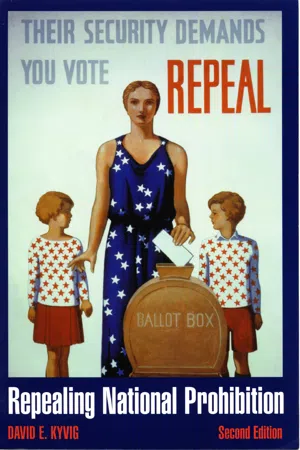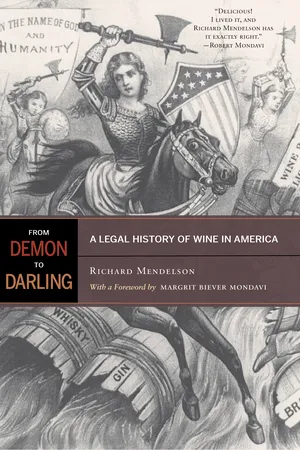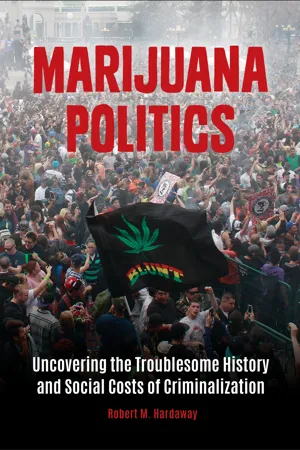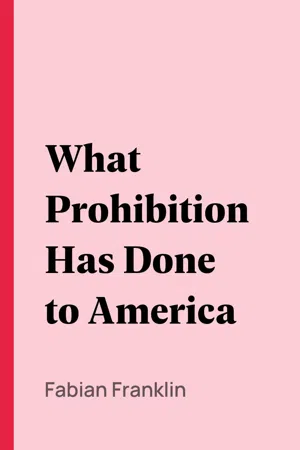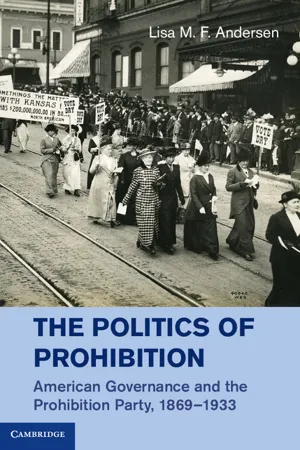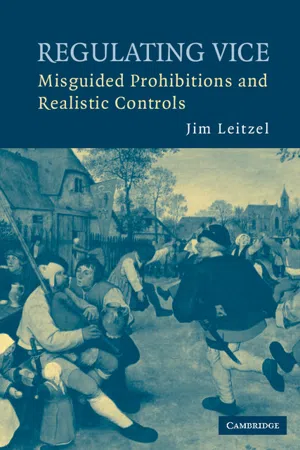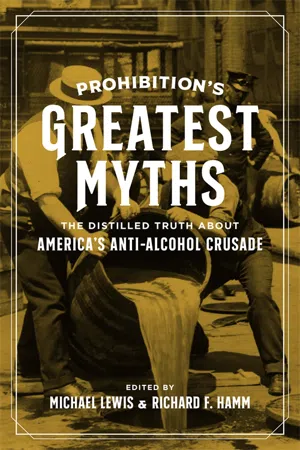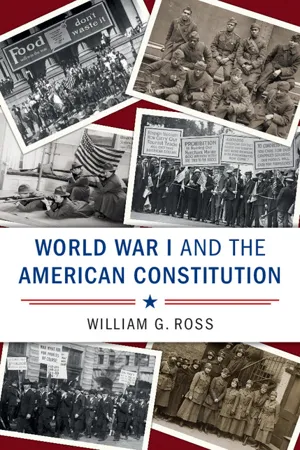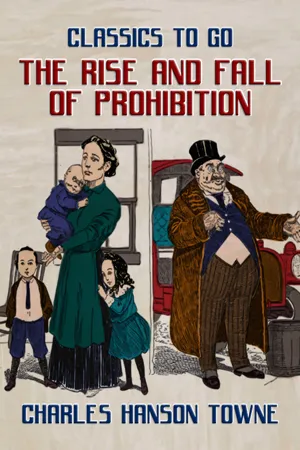Politics & International Relations
Prohibition Amendment
The Prohibition Amendment, also known as the 18th Amendment to the United States Constitution, was ratified in 1919 and prohibited the manufacture, sale, and transportation of alcoholic beverages. It was a result of the temperance movement and aimed to reduce crime and corruption, as well as improve public health and morality. The amendment was later repealed by the 21st Amendment in 1933.
Written by Perlego with AI-assistance
Related key terms
1 of 5
10 Key excerpts on "Prohibition Amendment"
- eBook - ePub
Repealing National Prohibition
Second Edition
- Hans P. Krings(Author)
- 1996(Publication Date)
- The Kent State University Press(Publisher)
1 ADOPTING NATIONAL PROHIBITIONThe crusade to abolish the use of alcoholic beverages through an amendment to the Constitution hit the United States like a whirlwind in the second decade of the twentieth century. In November 1913 the Anti-Saloon League of America first publicly appealed for a Prohibition Amendment. By January 1919, scarcely five years later, Congress had approved and forty-four state legislatures had ratified the Eighteenth Amendment, which proclaimed:A tremendously significant social reform affecting the lives of millions had suddenly become part of the nation’s rarely altered basic law.1. After one year from the ratification of this article the manufacture, sale, or transportation of intoxicating liquors within, the importation thereof into, or the exportation thereof from the United States, and all territory subject to the jurisdiction thereof for beverage purposes is hereby prohibited.2. The Congress and the several States shall have concurrent power to enforce this article by appropriate legislation.3. The article shall be inoperative unless it shall have been ratified as an amendment to the Constitution by the legislatures of the several States, as provided in the Constitution, within seven years from the date of the submission hereof to the States by the Congress.Proponents of the so-called dry law faced little organized resistance as they marched to their triumph. Only brewers, distillers, and other commercial interests made strenuous efforts to block the reform. Individuals and groups offended by the challenge to their ethnic cultural traditions or by the limitation of their right to choose what to drink objected to the national liquor ban, but they lacked the channels and agents to give their protest focus and strength. New opposition to the Eighteenth Amendment began to form, however, in the midst of the prohibitionist victory in response to the law itself, the manner of its adoption, and the political assumptions upon which it was based. The reaction against this important constitutional innovation, therefore, can only be understood in light of the circumstances of national prohibition’s creation. - eBook - PDF
From Demon to Darling
A Legal History of Wine in America
- Richard Mendelson(Author)
- 2009(Publication Date)
- University of California Press(Publisher)
TWO National Prohibition The Eighteenth Amendment represents the first effort in our history to extend directly by Constitutional provision the police control of the federal government to the personal habits and conduct of the individual. It was an experiment, the extent and difficulty of which was probably not appreciated. NATIONAL COMMISSION ON LAW OBSERVANCE AND E N F O R C E M E N T , 1931 Law ways cannot change folkways. 1 The nation's experience with National Prohibition from 1920 to 1933 attests to the truth of this adage. Even when the political, social, religious, and economic conditions in the country, along with widely accepted medical opinion, were aligned with the prohibition-ists, and even after the closure of the nation's saloons, prohibitory laws could not stop Americans from drinking. National Prohibition reduced liquor availability and increased liquor prices. The per capita consumption of all alcoholic beverages declined by nearly one-third. 2 This decline was particularly evident during the early 19205 and among members of the working class, who did not have the funds to stock a cellar before Prohibition took effect or to buy expensive boot-legged liquor during Prohibition. Prohibition also changed the drinking habits of Americans. According to the iron law of prohibition, any substance that is prohibited drives out the weaker, milder forms and increases the availability and use of stronger, more dangerous substances. 3 In the case of alcohol, fermented liquors are bulkier and harder to hide and smuggle, lower in alcoholic content, and less remu-nerative, than spirits. As a result, beer consumption declined by 70 percent from the period from 1911-1914 to 1927-1930, and the consumption of spir-its rose by 10 percent. 4 Reflecting this trend, spirit-based cocktails, mixed and drunk in speakeasies, became popular among middle-class men and 5° - eBook - ePub
Marijuana Politics
Uncovering the Troublesome History and Social Costs of Criminalization
- Robert M. Hardaway(Author)
- 2018(Publication Date)
- Praeger(Publisher)
Social commentators began to note the hypocrisy of politicians who defied the Prohibition laws in private while professing support in public. In more recent decades, U.S. presidents have admitted to using marijuana privately and yet have still publicly supported prohibition on cannabis.Today, criminalization of marijuana use deprives the government of untold billions in tax dollars that are diverted toward nonproductive criminal uses—as they were during Prohibition. Although it is impossible to precisely determine the effects of criminalization of drug use on the economy, the economic loss of billions of dollars—just when government programs such as Social Security and Medicare compete for scarce dollars from a deficit-ridden treasury—is staggering. The 18th Amendment was passed by the one of the largest majorities in American political history and prohibited the production, distribution, and sale of all alcoholic beverages, including wine and beer. In 1917, it was approved by a vote of 65–20 in the U.S. Senate and 246–95 in the House, and the consequent amendment was then ratified by 45 of the 48 states within 25 months (only 36 states were needed for ratification).4 When Prohibition’s enforcing legislation, the Volstead Act, was vetoed by President Woodrow Wilson for technical reasons on October 27, 1919, his veto was overridden by Congress by a vote of 176–5 in the House and 65–20 in the Senate.5The Origins of ProhibitionThe American temperance movement can be traced to a widely reported sermon against the sins of drunkenness—or intemperance—delivered by Reverend Increase Mather of New England in 1673. Ministers of such religious denominations as the Methodists, Presbyterians, and Congregational Church followed this call with their own intemperance sermons. Many church leaders demanded total abstinence from alcohol from all members of their congregations. Because such calls for voluntary abstinence had only limited effect among churchgoers and were widely disregarded by those outside the church, they were soon followed by demands for laws enacted and enforced by the state. - eBook - ePub
- Fabian Franklin(Author)
- 2005(Publication Date)
- Perlego(Publisher)
A law punishing drunkenness, which is a public nuisance, comes under the head I have been speaking of; a law forbidding a man to drink for fear that he may become a drunkard does not. And in fact the prohibitionists themselves instinctively recognize the difference, and avoid, so far as they can, offending the sense of liberty by so direct an attack upon it. It is safe to say that if the Eighteenth Amendment had undertaken to make the _drinking_ of liquor a crime, instead of the _manufacture and sale_ of it, it could not have been passed or come anywhere near being passed. There is hardly a Senator or a Representative that would not have recoiled from a proposal so palpably offensive to the instinct of liberty. Yet precisely this is the real object of the Eighteenth Amendment; its purpose and, if enforced, its practical effect is to make it permanently a crime against the national government for an American to drink a glass of beer or wine. The legislators, State and national, who enacted it knew this perfectly well; yet if the thing had been put into the Amendment in so many words, hardly a man of them would have cast his vote for it. The phenomenon is not so strange, or so novel, as it might seem; it has a standard prototype in the history of Rome. The Roman people had a rooted aversion and hostility to kings; and no Caesar would ever have thought of calling himself _rex_. But _imperator_ went down quite smoothly, and did just as well.In addition to its being a regulation of individual conduct in a matter which is in its nature the individual's own concern, Prohibition differs in another essential respect from those restrictions upon liberty which form a legitimate and necessary part of the operation of civil government. To put a governmental ban upon all alcoholic drinks is to forbid the _use_ of a thing in order to prevent its _abuse_. A Of course there are fanatics who declare--and believe--that _all_ indulgence in alcoholic drink, however moderate, is abuse; but to justify Prohibition on that ground would be to accept a doctrine even more dangerous to liberty. It is bad enough to justify the proscription of an innocent indulgence on the ground that there is danger of its being carried beyond the point of innocence; but it is far worse to forbid it on the ground that, however innocent and beneficial a moderate indulgence may seem to millions of people, it is not regarded as good for them by others. The only thing that lends dignity to the Prohibition cause is the undeniable fact that drunkenness is the source of a vast amount of evil and wretchedness; the position of those who declare that all objections must be waived in the presence of this paramount consideration is respectable, though in my judgment utterly wrong. But any man who justifies Prohibition on the ground that drinking is an evil, no matter how temperate, is either a man of narrow and stupid mind or is utterly blind to the value of human liberty. The ardent old-time Prohibitionist--the man who thinks, however mistakenly, that the abolition of intoxicating drinks means the salvation of mankind--counts the impairment of liberty as a small matter in comparison with his world-saving reform; this is a position from which one cannot withhold a certain measure of sympathy and respect. But to justify the sacrifice of liberty on the ground that the man who is deprived of it will be somewhat better off without it is to assume a position that is at once contemptible and in the highest degree dangerous. Contemptible, because it argues a total failure to understand what liberty means to mankind; dangerous, because there is no limit to the monstrosities of legislation which may flow from the acceptance of such a view. Esau _sold_ his birthright to Jacob for a mess of pottage which he wanted; these people would rob us of our birthright and by way of compensation thrust upon us a mess of pottage for which we have no desire. - eBook - PDF
The Politics of Prohibition
American Governance and the Prohibition Party, 1869–1933
- Lisa M. F. Andersen(Author)
- 2013(Publication Date)
- Cambridge University Press(Publisher)
256 The Politics of Prohibition Recalling Reconstruction, Prohibitionists suggested that the amend- ment “will be found absolutely insufficient unless it is in the hands of a party definitely committed to the prohibition policy. No man thinks that the 14th and 15th amendments to the constitution of the United States were adequate of themselves to insure liberty to the slave. It took a party committed to that policy.” 110 Whereas the ASL might taunt Prohibition- ists who “had been yelling for national Prohibition all their lives” and then “appeared with their hammer to knock that very proposal,” doctrinaire partisans affirmed that a “middle-of-the-road Prohibitionist” must “look askance on the constitutional amendment proposition” because “a prohi- bition law, either statutory or constitutional, does not destroy the liquor traffic” unless accompanied by an administration pledged to enforce it. 111 George Grant, a member of the Vindicator’s editorial staff, expressed his concern that the amendment campaign would suffocate the Prohibition Party and that then “the whole fight would have to be fought over again, without, so far as I can see, the slightest advantage from the adoption of the amendment.” 112 Even if a constitutional amendment were passed, anti-liquor advocates would still need a party that favored prohibition to do this work. Essentially, the amendment was “national option” that projected on the entire country the already established problems of local option. 113 Debates among party members regarding the amendment persisted throughout the years from 1913 to 1917. In a particularly heated exam- ple, the former state chair of California took that state’s chief party publication to task for overtly supporting the national amendment cam- paign. - eBook - PDF
Regulating Vice
Misguided Prohibitions and Realistic Controls
- Jim Leitzel(Author)
- 2007(Publication Date)
- Cambridge University Press(Publisher)
48 Merz (1931, p. 72). Prohibition 109 prohibition, the measure failed, even though a state-level prohibition had been adopted. 49 Urban areas in the northern United States were particularly unsym- pathetic to the Prohibition cause. Following the ratification of the Eighteenth Amendment in 1919, Congress needed to formulate legislation to implement the national Prohibition. (The amendment referred to “intoxicating liquors . . . for beverage purposes,” pro- hibiting imports and exports, manufacture, sale, and transportation. The “bever- age purposes” condition was necessary to exempt alcohol intended for indus- trial, medicinal, or sacramental use.) One possibility was that the wartime standard would be maintained, and hence that 2.75 percent beer would still be available. Alternatively, both beer and wine could have been exempt, if “intox- icating liquors” were deemed to refer only to distilled spirits. Congress chose a much stricter standard, however – the implementing legislation, known after the chair of the House Committee on the Judiciary as the Volstead Act, defined any product with an alcohol concentration above 0.5 percent (measured by volume) as an “intoxicating liquor.” To protect homemade alcoholic cider, an exception was built into the Volstead Act (as it had been in the Maine Laws of the previous century) for the rustic fermenter “manufacturing nonintoxicat- ing cider and fruit juices exclusively for use in his home,” and this exception was later interpreted by the courts as applying to homemade wine. 50 While sale was prohibited, purchase, possession and consumption remained legal, so that the alcohol ban during Prohibition approximates what is referred to as “decriminalization” in today’s drug policy debates. 51 In evaluating the effects of Prohibition, perhaps the most important datum is the extent of alcohol consumption during Prohibition, relative to the pre- Prohibition period or the years following repeal. - eBook - ePub
Prohibition's Greatest Myths
The Distilled Truth about America's Anti-Alcohol Crusade
- Michael Lewis, Richard Hamm(Authors)
- 2020(Publication Date)
- LSU Press(Publisher)
MYTH 3 THE Prohibition Amendment AND SUPPORTING LAWS SOUGHT TO BAN INDIVIDUAL DRINKING LISA M. F. ANDERSENIt was 1917, and Senator Thomas Hardwick, a Georgia Democrat, issued a challenge to his colleagues. No friend ofprohibition himself, his patience tried after listening to senator after senator pontificate on how the so-called Prohibition Amendment would end drunken debauchery, Hardwick finally rose to point out a problem: the amendment’s text did not make alcohol consumption illegal. Was this simply an oversight? Ifthe amendment were to include a ban not only on the “manufacture, sale, importation, exportation, and transportation” but also on the consumption of alcohol, he noted, then “ that is complete prohibition, practical prohibition.” Anything less than such a clear statement of the amendment’s aims would be “utterly and totally insincere and uncandid,” and Hardwick therefore proposed that consumption immediately be added to the list. 1Hardwick’s ostensibly helpful suggestion was what contemporaries called a “joker amendment,” one designed not to increase candor about the amendment’s purpose but instead to sink the Prohibition Amendment before it was launched. His colleagues were not amused by this showboating. Yet the confusion Hardwickpretendedto feel is now rampant among modern Americans. Libertarians, for example, assume that the Eighteenth Amendment must have been about banning consumption when they use persistent Prohibition Era drunkenness as evidence that it is futile to legislate against human desires. Liberal reformers likewise assume that the Eighteenth Amendment was primarily an anti-consumption vehicle when they contend that prohibition’s overscrutiny of - eBook - PDF
- William G. Ross(Author)
- 2017(Publication Date)
- Cambridge University Press(Publisher)
Rec. 5642 (August 1, 1917) (statement of Sen. Cummins). 107 56 Cong. Rec. 427 (December 17, 1917). 108 Ibid., 440–41. 109 Ibid., 427. 110 “Prohibition and the Supreme Court” (editorial), The Nation, December 27, 1919, 819. 111 56 Cong. Rec. 441 (December 17, 1917) (statement of Rep. Graham). 112 Fisher, “Can Prohibition Drive Out Drink?” 19. Prohibition of Alcohol 201 transportation of alcohol into dry states, Webb complained that there was no way to “localize the bad effects that flow from this national evil” because it was impossible to prevent “the degenerates, inebriates, weak-minded, crim- inal, and diseased persons whom it had produced” from moving into dry states. 113 Proponents also predicted that federal courts would enforce federal legislation more effectively than state courts had enforced their own laws. 114 As Cornell Law Professor Charles K. Burdick observed in 1920, the police power issue presented “constitutional and political questions of immeasurable importance” because it tested how far the amendment process could go in transferring state powers to the federal government or federal powers to the states. If an amendment could transfer alcohol regulation to the federal government, it was theoretically possible, he argued, for a constitutional amendment to virtually abolish the states – or to dissolve the federal government. If, however, the prohibition amend- ment was unconstitutional, the federal constitution would be so rigid that it would, as Burdick pointed out, “condemn us to the strait jacket of past political theories” and would limit political development of the police power to the arena of the states. 115 Opponents of the amendment warned that it would provide a precedent for other regulations of personal conduct, including food, clothing, and even religious beliefs and practices. 116 An opponent of alcohol prohibition warned that “cigarettes, coffee, and pie are marked by hordes of other cranks for successive destruction through . - eBook - PDF
Social and Economic Control of Alcohol
The 21st Amendment in the 21st Century
- Carole L. Jurkiewicz, Murphy J. Painter(Authors)
- 2007(Publication Date)
- Routledge(Publisher)
Tey struggled to create a policy and a practice in a nondual-ist world. Alcohol was not simply good or simply bad. It was not to be banned nor was it to be allowed to be manufactured, distributed, and sold in an unrestricted way. Te problem is more exigent with alcoholic beverages, but is a general one: the extent of regulation in a society that rejects both a command economy and unregulated license. In efect, the problem was, and still remains, to shape and The Repeal Program n 99 defne ordered liberty for the market, or less abstractly, to harness and constrain the proft motive, to allow only that degree of entrepreneurial autonomy that comports with regulated distribution, sale, and consumption. Liquor control after Repeal was discussed in print, but not at length. Tis was for several reasons. Until 1930, reformers assumed that Prohibition would not be repealed and turned their eforts consequently to discussions of modifcation of the Volstead Act. Charles Merz, in his history of the politics and administration of Pro-hibition, suggests the year 1930, when he ended his study, as a turning point. 5 As Prohibition became increasingly beleaguered, attackers stopped trying to tweak the system, which instead became the task of its defenders, who suggested that relax-ation of the Volstead Act, permitting home winemaking and brewing for instance, might buy acquiescence to Prohibition’s continuation. Support for the 18th Amendment crumbled so rapidly that there was little time for discussion. 6 Congress did not spend time debating particulars of new alcoholic beverage regulatory codes. It decided, after some debate, that alcoholic beverage regulation was to be primarily a state matter and that the Constitution should, through the second paragraph of the 21st Amendment, protect state regulation from being undercut by importations, as had occurred before Prohibition. 7 Te state ratifying conventions devoted almost no time at all to discussing what would emerge after Repeal. - eBook - ePub
- Charles Hanson Towne(Author)
- 2020(Publication Date)
- Otbebookpublishing(Publisher)
The same paper has this to say, editorially, on “The Achilles Heel of Prohibition”:“The United States ‘easily holds first place in the manufacture of statutory law,’ declared Mr. Emery in his speech. ‘A single Congress,’ he added, ‘usually receives some 20,000 bills. Many of the States consider not less than 1000. During the year 1921, 42 legislatures were in session. Judging from past years, Congress and the States annually enact an average of 14,000 statutes. The State and National legislation of a single year recently required more than 40,000 pages of official print.’“Certainly, it is time for a Congress on limitation of legislation.”“National Prohibition has not been long on trial. The final effect of the fundamental change in our Constitution involved in the enactment of the Eighteenth Amendment has not been, and cannot be, yet determined. All the evidence which we have seen, however, tends to show that the nation is better off materially and physically under Prohibition than under the system which permitted the sale of intoxicating beverages. Benefits to be derived from the elimination of the drink traffic did not wait upon our National experiment for demonstration. They have been obvious for centuries in the experience of peoples from whom alcohol has been barred by religious authority. There remains, however, a very serious problem confronting the defenders and advocates of national prohibition. It is the problem of maintaining the respect for law and order and that mental habit of ready acceptance of legal enactments which is one of the strongest bulwarks of applied democracy.“We do not doubt for a minute that the majority of the people of the United States are in favor of national prohibition. Even in great cities where the liquor interests have had their stronghold we suspect that the number of men and women who would vote for national prohibition, were it put to the popular test, is much larger than the ‘wets’ are willing to admit. We say this in order that this editorial may not be considered as an argument for the repeal of Prohibition Amendment by those who are working for such ends upon premises which we regard as distinctly unsound.“To say that there is a majority in favor of the amendment does not imply that there is not a large and active minority in favor of its repeal. The greatest problem confronting advocates of national prohibition lies in the fact that this large minority has not accepted the amendment with that good faith and willing spirit which we have grown to look upon as characteristic of the spirit of the losers in our political controversies. There have been great changes in our government prior to the enactment of the Prohibition Amendment, but almost invariably these changes, once effected, have been acquiesced in by their most ardent opponents. We are not speaking of individual violators, but of the public attitude towards the law.
Index pages curate the most relevant extracts from our library of academic textbooks. They’ve been created using an in-house natural language model (NLM), each adding context and meaning to key research topics.
